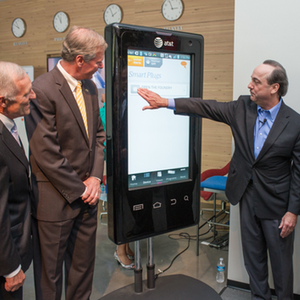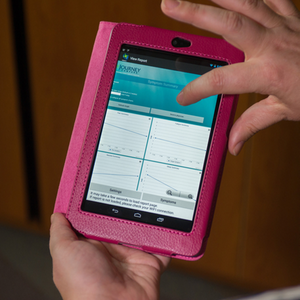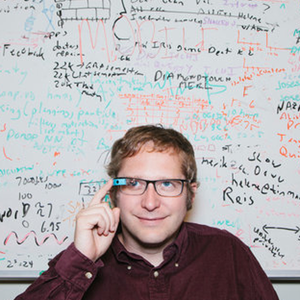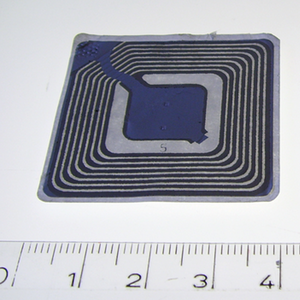To kick off the new year, I prepared a list of the Top Ten Technologies for our friends at the Atlanta Business Chronicle. The limitations of smearing ink on dead trees forced the newspaper to cut the list down to five. But electrons are cheap. Just for completeness, here’s my original Top Ten, with special attention to how they’ll impact Atlanta and Georgia. Enjoy!
Privacy
The overwhelming tech trend of 2014 is going to be privacy: privacy from online crooks, privacy from advertisers, privacy from your neighbors, even privacy from your government. Enough of us have clicked enough Terms Of Service agreements without reading them that we’ve leaving elephant-sized footprints across the Internet, even if we just think we’re just making a phone call to the local pizza joint or checking our friends’ selfies on Facebook. Online criminals have known about these capabilities for years, but Edward Snowden’s revelations pushed them into the headlines. Expect a new wave of products and services to shrink your digital footprint without the impractical requirement of going off-the-grid entirely. Many of these innovations will rely on advanced information security techniques like those being developed at Georgia Tech’s nationally-recognized Information Security Center.
Cryptocurrencies
One logical consequence of the privacy wars is the idea of virtual currencies based on cryptographic principles, also known as cryptocurrencies. Most people at this point have at least heard about Bitcoin — a digital currency and a value store that is untraceable, easily convertible to local cash, and immune to the inflationary or confiscatory schemes of governments. The underlying infrastructure of Bitcoin and its competitors may also find unexpected uses in document security, trusted collaboration, and even circumventing government “kill switches” on the Internet. As the center of the transaction processing universe, Georgia companies are well-positioned to be significant players in the cryptocurrency world. There are already at least three Bitcoin-related startups in Atlanta, and there will be more in 2014.
Location Awareness
More and more, Internet services are aware not only of what we’re reading and saying, but where we are. Although it triggers some of the privacy concerns above, location awareness will create entirely new types of transactions and advertising opportunities. From simple location-based coupons to more elaborate engagements across multiple transactions and locations (think “scavenger hunt”), Atlanta’s creative agencies will find new ways to microtarget advertisements and promotions.
Mobility and the Cloud
As we become thoroughly dependent on our smartphones, tablets, and other portable devices, we want no-compromise access to our data, wherever we are. In addition to driving up the demands for cellular data services, this will also accelerate the movement of personal and corporate data to the “cloud.” Already, if you drop your smartphone out of a canoe, you can purchase a new one and be up and running again with all your contacts, calendar, and email stored safely in the cloud. Extending this to other types of data brings new security risks. As a national leader in both mobile infrastructure and mobile development, Atlanta will be one of the leading players in the migration to mobile cloud offerings.
Electronic Health
After decades of unnecessary clipboard, we’ve finally passed the tipping point where most physicians are using electronic medical records. Now the challenge is using that electronic data to make patients healthier. There are thousands of incompatible record systems out there. Georgia Tech’s newly-opened I3L is the first national interoperability test and development center for health information technology (HIT) innovation. And Georgia Tech has worked with hospitals and clinicians in Rome, Georgia, to roll out the first-in-the-nation MyJourney Compass project to help patients communicate with healthcare providers, access their health information, and link to credible information on the Internet. Since Georgia has more health IT startups than any other state, expect to read a lot more about electronic health applications in 2014.
Wearable Technology
2013 proved to be a mixed bag for wearable technology. Fitness wristbands sprouted like mushrooms after a rainstorm, and many people took their first step into the “quantified self” by tracking footsteps, exercise, calories, and sleep patterns. At the same time, some of the hype around Google Glass turned into a backlash, as the new head-mounted cameras ran into cultural resistance. Around the country, certain restaurants and bars banned Glass, and at least one woman received a traffic ticket for driving while wearing Glass. Those societal norms won’t erode quickly, so 2014 will probably see the wearable technology focus on less obtrusive wristbands and under-the-clothing sensors.
3D Printing
Last year, if you wanted to experiment with 3D printing, you needed to be a geek or have geeky friends. In 2014, you can simply upload your file to Office Depot and pick up your printed object the next day. Although not sophisticated enough for most finished goods, 3D printing will begin to replace the entire supply chain of warehouses, packing, and shipping for many spare parts and highly-customized items. If UPS isn’t working on providing this as a service, I’d be surprised. And now, companies such as Georgia Tech spinout DDM Systems, are working on taking 3D printing far beyond plastic toys and into fabricating high-value components like turbine blades.
MOOCs
Would you go to a university that only let you read books written by its faculty? Why should you only go to lectures offered by the same faculty? The explosion in Massively Open Online Courses (MOOCs) educated millions of people in 2013. Starting in January 2014, Georgia Tech will admit 400 students to the first-in-the-country online Master’s degree program in computer science. Graduates will receive a fully-accredited Georgia Tech diploma for a fraction of the cost of the traditional residential Master’s, all without setting foot on campus.
The Internet of Things
No self-respecting futurist can write a Top Ten list nowadays without noting “The Internet of Things.” Whether talking about thermostats, traffic lights, teapots, or Urvaksh’s new Tesla, everything will have a persistent connection to the Internet. Corporate giants (including Atlanta operations for AT&T, NCR, and Cisco) are scrambling to get as many sensors and communication chips into as many devices as possible — both to enable a new generation of services as well as to extract new streams of payments. Georgia Tech’s chip design expertise will underpin some interesting new startups in 2014.
Energy Harvesting
All those sensors everywhere will require power. And although batteries are cheap, changing batteries isn’t. New energy-harvesting techniques that will allow sensors to be powered by air currents, bloodflow, or the motion of your body. Keep an eye on the flexible triboelectric generators being pioneered by the Center for Nanostructure Characterization at Georgia Tech.
Top Ten lists are inherently subjective, but that’s my best guess for the coming year. What do you think?










Here are my binary answers for your 10 technologies
1. Yes, more companies will sprout up to offer services like these. No, Americans will not flock to them in great numbers and they will flame out quickly.
2. No. They will continue to be a niche product loved mostly by the techno-wing of the recent gold bug hoards. Until the valuations stabilize, which I don’t think will be in 2014, cryptocurrencies will still have little use for the vast majority of people.
3. No. The ever-promised world of Minority Report advertising will still fail to materialize in the next year. Technology hasn’t been the problem for years now, people caring enough to act on it has. And your privacy point is an important one.
4. Yes, and this is another reason why privacy won’t actually take off.
5. Absolutely, although it will be in no small part due to government regulations.
6. Yes, and I will argue that wearable trackers and wearable computers are totally separate markets that shouldn’t be grouped together. It would be like grouping belts and ties.
7. No. 3D printing is (seemingly perpetually) another couple years out from competing with someone printing screws for a hundredth of a cent. More focus on things like what DDM is doing would be much better for the industry because it uses new technology to do things that are impossible with current processes rather than trying to compete on price. Many great new companies don’t compete on efficiency, they create new markets where you can be win even while initially inefficient.
8. No. They’ll continue to exist, but total enrollment will fall and the companies will continue to find it hard to monetize in a way that justifies their existence as for-profit entities.
9. Yes, the ability to monitor and control all of your “stuff” is incredibly attractive to many people and businesses alike. Note that this is yet another strike against privacy, though.
10. Yes, there will be significant focus and advancement in this area. No, I don’t think there will be much adoption of the technology because it won’t be far enough along yet.
I do think it’s interesting that seven out of my ten (eight, if you worry about people cheating on MOOCs) have privacy concerns. That’s going to be the megatrend for the next few years, I think.